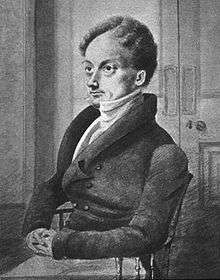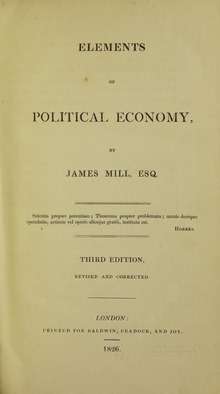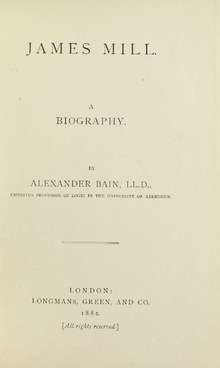James Mill
James Mill (born James Milne,[1] 6 April 1773 – 23 June 1836[2]) was a Scottish historian, economist, political theorist, and philosopher. He is counted among the founders of the Ricardian school of economics.[3] He also wrote the monumental work The History of British India. He was the first writer to divide Indian history into three parts: Hindu, Muslim and British,[2] a classification which has proved surpassingly influential in the field of Indian historical studies, but which is seen in recent decades as being deeply problematic.
James Mill | |
|---|---|
 | |
| Born | James Milne[1] 6 April 1773 Northwater Bridge, parish of Logie Pert, Angus, Scotland |
| Died | 23 June 1836 (aged 63) Kensington, London, England |
| Alma mater | University of Edinburgh |
| Spouse(s) | Harriet Burrow |
| Era | 19th-century philosophy |
| Region | Western philosophy |
| School | Associationalism Utilitarianism Liberalism Ricardian economics |
Main interests | Psychology Ethics Economics |
Influences
| |
Influenced
| |
Mill was the father of John Stuart Mill, a noted philosopher of liberalism and utilitarianism, and a colonial administrator at the East India Company.
Biography
James Milne, later known as James Mill, was born in Northwater Bridge, in the parish of Logie Pert, Angus, Scotland, the son of James Milne, a shoemaker and small farmer. His mother, Isabel Fenton, of a family that had suffered from connection with the Stuart rising, resolved that he should receive a first-rate education, and after the parish school they sent him on to the Montrose Academy, where he remained until the unusual age of seventeen and a half. He then entered the University of Edinburgh, where he distinguished himself as a Greek scholar.[2]
In October 1789, he was ordained as a minister of the Church of Scotland, but met with little further success. According to John Stuart Mill's Autobiography his father, though "educated in the creed of Scotch Presbyterianism, had by his own studies and reflections been early led to reject not only the belief in Revelation but the foundations of what is commonly called Natural Religion."[4] From 1790 to 1802, while supporting himself by various tutorships, he also pursued various historical and philosophical studies. With little prospect of a career in Scotland, in 1802 he went to London, in company with Sir John Stuart of Fettercairn, then member of parliament for Kincardineshire, and devoted himself to his literary work. From 1803 to 1806, he was editor of an ambitious periodical called the Literary Journal, which tried to give a summary view of all the leading departments of human knowledge. During this time he also edited the St James's Chronicle, published by the same proprietor. In 1804 he wrote a pamphlet on the corn trade arguing against a tariff (or 'bounty') on the export of grain. In 1805 he published a translation (with notes and quotations) of An Essay on the Spirit and Influence of the Reformation of Luther by Charles de Villers on the Reformation, and an attack on the alleged vices of the papal system. About the end of this year he began work on The History of British India, which was to occupy him for twelve years rather than the three or four that he had expected.[2]
In that year too he married Harriet Burrow, whose mother, a widow, kept what was then known as an establishment for lunatics in Hoxton. They took a house in Pentonville where their eldest son John Stuart Mill was born in 1806.[2]
.jpg)
In 1808 he became acquainted with Jeremy Bentham, who was twenty-five years his senior, and for many years his chief companion and ally. He adopted Bentham's principles in their entirety, and determined to devote all his energies to bringing them before the world. Between 1806 and 1818, he wrote for the Anti-Jacobin Review, the British Review and The Eclectic Review; but there is no means of tracing his contributions. In 1808, he began to write for the more prominent Edinburgh Review, to which he contributed steadily till 1813, his first known article being "Money and Exchange". He also wrote on Spanish America, China, Francisco de Miranda, the East India Company, and freedom of the press. In the Annual Review for 1808 two articles of his are traced – a "Review of Fox's History", and an article on "Bentham's Law Reforms", probably his first published notice of Bentham. In 1811 he co-operated with William Allen (1770–1843), a Quaker and chemist, in a periodical called the Philanthropist. He contributed largely to every issue – his principal topics being Education, Freedom of the Press, and Prison Discipline (under which he expounded Bentham's Panopticon). He made powerful onslaughts on the Church in connection with the Bell and Lancaster controversy, and took a part in the discussions that led to the foundation of the University of London in 1825. In 1814 he wrote a number of articles, containing an exposition of utilitarianism, for the supplement to the fifth edition of the Encyclopædia Britannica, the most important being those on "Jurisprudence", "Prisons", "Government"[2] and "Law of Nations".
The History of British India was published in 1818, and obtained a great immediate and enduring success.[6] It brought about a matching change in the author's fortunes, and in the year following he was appointed an official in India House in the important department of the Examiner of Indian Correspondence. He gradually rose through the ranks until in 1830 he was appointed head of the office, with a salary of £1900, raised in 1836 to £2000. His great work on economics, the Elements of Political Economy, appeared in 1821 (3rd and revised ed. 1825).[2][7]
From 1824 to 1826, Mill contributed a number of articles to the Westminster Review, the organ of the Radical party, in which he attacked the Edinburgh and the Quarterly Reviews, and the ecclesiastical establishment. In 1829 appeared the Analysis of the Phenomena of the Human Mind. From 1831 to 1833, Mill was largely occupied in the defence of the East India Company, during the controversy attending the renewal of its charter, he being in virtue of his office the spokesman of its Court of Directors. For the London Review, founded by Sir William Molesworth in 1834, he wrote a notable article entitled "The Church and its Reform", which was much too sceptical for the time and injured the Westminster Review. Mill himself was an atheist.[8] His last published book was the Fragment on Mackintosh (1835).[2]
Intellectual legacy
The History of British India
Mill preferred to take a more theoretical approach to social subjects than the empirical one common at the time. His best known literary work is his History of British India, in which he describes the acquisition of the Indian Empire by England and later the United Kingdom. He also brings political theory to bear on the delineation of the Hindu civilization, and subjects the conduct of the actors in the successive stages of the conquest and administration of India to severe criticism. The work itself, and the author's official connection with India for the last seventeen years of his life, effected a complete change in the whole system of governance in the country.[2] Mill never visited the Indian colony, relying solely on documentary material and archival records in compiling his work. This fact has led to severe criticism of Mill's History of India by notable economist Amartya Sen.[9]
According to Thomas Trautmann, "James Mill's highly influential History of British India (1817) – most particularly the long essay 'Of the Hindus' comprising ten chapters – is the single most important source of British Indophobia and hostility to Orientalism".[10] In the chapter titled General Reflections in "Of the Hindus", Mill wrote "under the glosing exterior of the Hindu, lies a general disposition to deceit and perfidy".[11] According to Mill, "the same insincerity, mendacity, and perfidy; the same indifference to the feelings of others; the same prostitution and venality" were the conspicuous characteristics of both the Hindoos and the Muslims. The Muslims, however, were perfuse, when possessed of wealth, and devoted to pleasure; the Hindoos almost always penurious and ascetic; and "in truth, the Hindoo like the eunuch, excels in the qualities of a slave". Furthermore, similar to the Chinese, the Hindoos were "dissembling, treacherous, mendacious, to an excess which surpasses even the usual measure of uncultivated society". Both the Chinese and the Hindoos were "disposed to excessive exaggeration with regard to everything relating to themselves". Both were "cowardly and unfeeling". Both were "in the highest degree conceited of themselves, and full of affected contempt for others". And both were "in physical sense, disgustingly unclean in their persons and houses".[12]
British politics
Mill also played a great part in British politics, and was a dominant figure in the establishment of what was called "philosophic radicalism". His writings on government and his personal influence among the Liberal politicians of his time determined the change of view from the French Revolution theories of the rights of man and the absolute equality of men to the claiming of securities for good government through a wide extension of the franchise. It was under this banner that the Reform Bill was fought and won. His Elements of Political Economy followed up the views of his friend David Ricardo. By 1911, the Encyclopædia Britannica described it as being of mainly historical interest, "an accurate summary of views that are now largely discarded".[2] Among the more important of its theses are:[2]
- that the chief problem of practical reformers is to limit the increase of population, on the assumption that capital does not naturally increase at the same rate as population (ii. § 2, art. 3)
- that the value of a thing depends entirely on the quantity of labour put into it; and
- that what is now known as the "unearned increment" of land is a proper object for taxation.
Other areas
By his Analysis of the Phenomena of the Human Mind and his Fragment on Mackintosh Mill acquired a position in the history of psychology and ethics. He took up the problems of mind very much after the fashion of the Scottish Enlightenment, as then represented by Thomas Reid, Dugald Stewart and Thomas Brown, but made a new start, due in part to David Hartley, and still more to his own independent thinking. He carried out the principle of association into the analysis of the complex emotional states, as the affections, the aesthetic emotions and the moral sentiment, all which he endeavoured to resolve into pleasurable and painful sensations. But the salient merit of the Analysis is the constant endeavour after precise definition of terms and clear statement of doctrines. He had a great effect on Franz Brentano who discussed his work in his own empirical psychology.[13] The Fragment on Mackintosh severely criticizes the alleged flimsiness and misrepresentations of Sir James Mackintosh's Dissertation on the Progress of Ethical Philosophy (1830), and discusses the foundations of ethics from the author's utilitarian point of view.[14]
Major works


- An essay of the impolicy of a bounty on the exportation of grain, 1804.
- "Lord Lauderdale on Public Wealth", 1804, Literary Journal Vol. IV, No. 1[15]
- Commerce Defended, 1808.
- "Thomas Smith on Money and Exchange", 1808, Edinburgh Review no. XXV, pp. 35–68[16]
- The History of British India, 3 vols., 1817 (and many later editions)
- "Government", 1820, Encyclopædia Britannica
- Elements of Political Economy, 1821
- "Liberty of the Press", 1825, Encyclopædia Britannica
- Essays on Government, Jurisprudence, Liberty of the Press, Education, and Prisons and Prison Discipline, 1823.
- Analysis of the Phenomena of the Human Mind, 2 vols., 1829.[17] Revised edn, 2 vols, 1869.[18]
- Essay on the Ballot [19] and Fragment on Mackintosh [20], 1830.
- "Whether Political Economy is Useful", 1836, London Review, vol. II, pp. 553–572.
- The Principles of Toleration, 1837.
See also
- Capitalism
- Contributions to liberal theory
- Free trade
- James Tod
Notes
- Ball, Terence (19 June 2014). "James Mill". Stanford Encyclopedia of Philosophy. Stanford University. Retrieved 4 April 2018.
- Chisholm 1911, p. 453.
- Keynes, John Maynard. "The General Theory". The General Theory of Employment, Interest and Money. Retrieved 4 April 2018.
- https://www.laits.utexas.edu/poltheory/mill/auto/auto.c02.html
- Stephen 1894, p. 32.
- Mill, James (1817), The History of British India (1 ed.), London: Baldwin, Cradock, and Joy, retrieved 11 December 2012
- Mill, James (1821), Elements of Political Economy (First ed.), London: Baldwin, Cradock, and Joy, retrieved 11 December 2012
- https://mises.org/library/james-mill-laissez-faires-lenin
- Amartya Sen's address given to the Millennium Session of the Indian History Congress
- Trautmann, Thomas R. (2006) [1997]. Aryans and British India (2nd Indian ed.). New Delhi: YODA Press. p. 117. ISBN 81-902272-1-1.
- Mill, James (1858). The History of British India. Madden. p. 150.
- Dharampal, The Beautiful Tree.
- Franz Brentano: Psychologie vom empirischen Standpunkt. Ed. Oskar Kraus, 2 vols. Leipzig: Meiner, 1924–25; ed. Mauro Antonelli. Heusenstamm: Ontos, 2008
- Chisholm 1911, p. 4543.
- Sowell, Thomas (8 March 2015). Say's Law: An Historical Analysis. Princeton University Press. p. 115. ISBN 9781400871223. Retrieved 6 April 2018.
- Henderson, John P.; Davis, John B. (6 December 2012). The Life and Economics of David Ricardo. Springer Science & Business Media. p. 668. ISBN 9781461561293. Retrieved 6 April 2018.
- Analysis of the Phenomena of the Human Mind. 1. 1829. Analysis of the Phenomena of the Human Mind. 2. 1829.
- Analysis of the Phenomena of the Human Mind. 1. 1869. Analysis of the Phenomena of the Human Mind. 2. 1869.
- Essay on the Ballot. 1830.
- A Fragment on Mackintosh. 1835.
References

- Stephen, Leslie (1900). The English Utilitarians: James Mill. ii. Duckworth & Co.
- Stephen, Leslie (1894). . In Lee, Sidney (ed.). Dictionary of National Biography. 37. London: Smith, Elder & Co. pp. 382–388.
- Bain, Alexander (1882). James Mill, A Biography (1 ed.). London: Logmans, Green & Co.
- Bower, G.S. (1881). Hartley and James Mill. Putnam.
- McCosh, James (1885). Scottish Philosophy.
- Mill, J.S. (1873). Autobiography. Henry Holt.
- Ribot, Théodule-Armand (1873) [1870]. La Psychologie anglaise (Eng. trans. ed.).
- Morley, John (1882). "The Life of James Mill". Fortnightly Review. xxxvii: 476.
- Wallas, Graham (1898). The Life of Francis Place.
Further reading
- Bain, Alexander (January 1876). "The Early Life of James Mill". Mind. 1 (1).
- Rudolph, Lloyd I. (2008). "Tod vs Mill: Clashing Perspectives on British Rule in India and Indian Civilization". In Tillotson, Giles (ed.). James Tod's Rajasthan: The Historian and His Collections. Mumbai: Radhika Sabavala for Marg Publications on behalf of the National Centre for the Performing Arts. ISBN 81-85026-80-7.
- . New International Encyclopedia. 1905.

- Stephen, Leslie (1894). . Dictionary of National Biography. 38. p. 32.
External links
| Wikisource has original works written by or about: James Mill |
| Wikiquote has quotations related to: James Mill |
- Works by James Mill at Project Gutenberg
- James Mill
- James Mill Librivox audio
- Stanford Encyclopedia of Philosophy entry
- James Mill's common place books
- E-text of Analysis of the Phenomena of the Human Mind, as edited by J.S. Mill, with commentaries by himself and others.
- "James Mill". HET, The Institute for New Economic Thinking.
- Portraits of James Mill at the National Portrait Gallery, London
